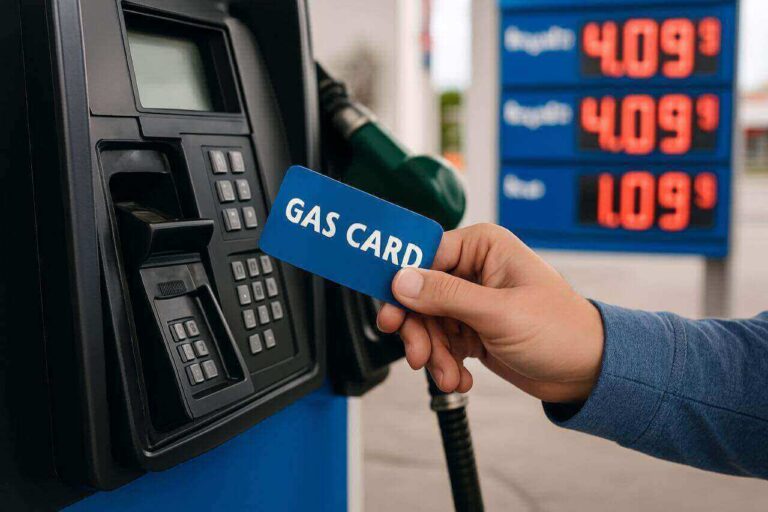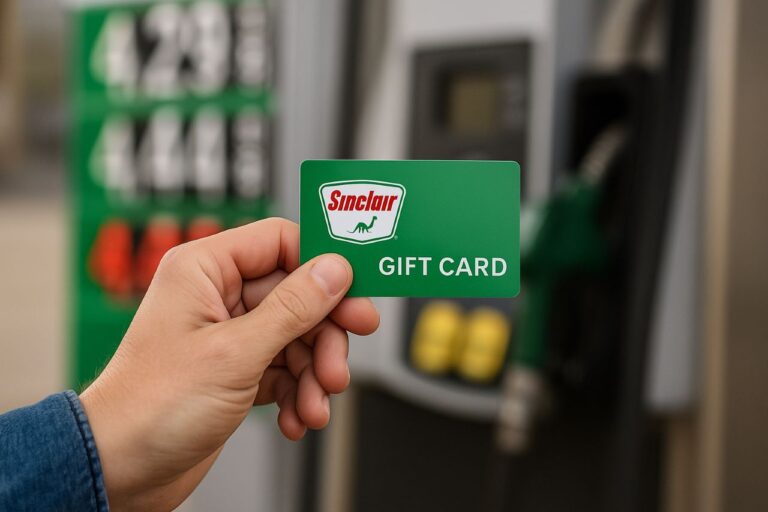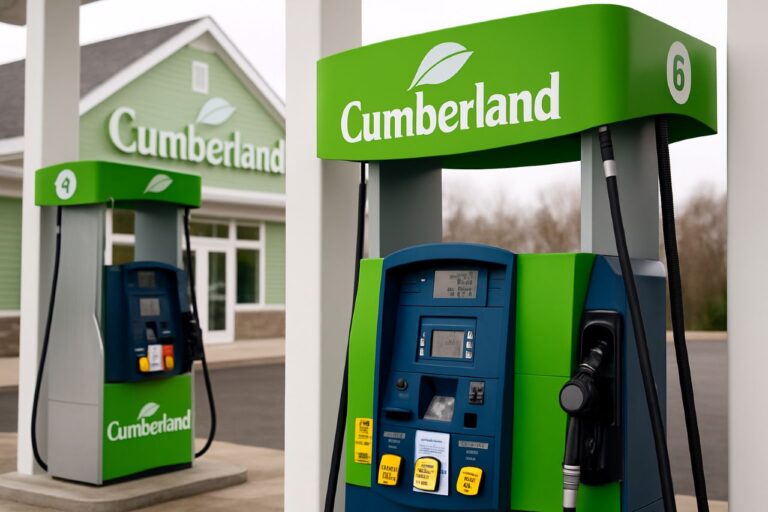Company Gas Card Policy: 10 Powerful Tips for Total Control
Company Gas Card Policy is an important aspect of managing fuel costs and employee responsibility. Implemented properly, it facilitates more efficient operations and prevents abuse of company assets. Any expanding business requires a disciplined method of controlling and maximizing fuel expenditures.
It takes more than issuing cards to create a strong policy—it’s establishing definite rules, boundaries, and expectations. With these tips and tools, you can take complete control of your fuel consumption in your fleet.
Table of Contents
Why You Need a Company Gas Card Policy

In the absence of a defined company gas card policy, companies expose themselves to overspending, misuse of the card, and inadequate budgeting. A policy serves as an instruction manual, stipulating how employees should use fuel cards and safeguarding company money.
Effective fuel management leads to enhanced productivity and compliance and cost savings, according to Fleetio. A good policy avoids mistakes and ensures that each gallon is tracked.
Types of Gas Cards for Businesses
When it comes to controlling fuel costs, companies have several gas card options to consider. Choosing the right kind reinforces your company gas card policy and provides greater control over spending. These are the primary types:
Fleet Cards
For companies that use multiple vehicles, fleet cards provide simple monitoring of fuel spending per vehicle. They tend to have comprehensive reporting capabilities, driver ID monitoring, and spending limits, which suit logistics, delivery businesses, and mobile crews.
Universal Gas Cards
These cards can be used at nearly all gas stations across the country, providing the most flexibility for drivers. They’re especially helpful for companies whose workers drive long distances or over areas where certain brands might not be readily available.
Fuel-Only Cards
Since the name is descriptive, fuel-only cards limit expenditures to diesel, gasoline, or other types of fuel. Fuel-only cards assist in not spending company funds on non-fuel items such as snacks, washes, or repairs to vehicles, making sure that company gas card policy strictly targets fuel needs.
Selecting the correct card is essential in aligning it with your company’s financial goals. It allows you to permit or deny spending in accordance with certain business needs and travel behavior.
For instance, you can compare leading business gas card providers such as WEX Fleet Cards for their strong management features and Shell Small Business Cards that frequently include fuel savings and reward schemes. Comparing factors like acceptance network, reporting options, and security controls can enable you to make the most appropriate choice for your business.
How to Choose the Right Gas Card Provider
Choosing the appropriate gas card provider is critical to having your fuel management system complement your company gas card policy efficiently. The following are some of the most important things to look out for when choosing:
Fees and Discounts
Carefully review the fee structure. Certain cards may include annual or monthly fees, but other cards will forgo fees depending on usage. Also, check for fuel purchase discounts, bulk discounts, or cashback rewards that can substantially lower your overall fuel expense.
Accepted Locations
Ensure the card can be accepted in fuel stations convenient to your business. Universal gas cards provide greater acceptance in most fuel stations, while brand cards such as Shell or BP provide better discounts but restricted station coverage.
Define Who Gets a Gas Card
Select a provider that provides real-time transaction monitoring, GPS tracking, and instant alerts. Such features allow you to identify suspicious activity, prevent abuse, and provide you with greater control over how and where your drivers are using the card.
Integration with Accounting Systems
Smooth integration with applications such as QuickBooks, Xero, or your own expense tracking software streamlines reconciliation and reporting. It minimizes data entry and makes it easier for your finance staff to keep accounts accurate and up to date.
A good gas card program must be more than merely a payment solution—it must compliment your company gas card policy, promote responsible expenditures, and offer in-depth, clear reporting. This guarantees effective fuel monitoring, facilitates budgeting efforts, and reduces the risk of abuse throughout your fleet or employees.
Powerful Tips for Total Control

A solid and clearly worded company gas card policy is essential to managing fuel expenses effectively, minimizing the potential for abuse, and keeping your employees informed about the limitations and expectations involved in using corporate gas cards. The next ten practices will assist you in developing, implementing, and refining a policy that works for your business.
1. Clearly Define Eligibility Criteria
The initial step in having an effective gas card program is to define the workers who can be given a card. Not all workers require one. Restricting issuance to those who drive frequently on business—like delivery drivers, field agents, or sales representatives—guarantees the cards are provided only to those with legitimate work-related fuel requirements.
This prevents unnecessary dispensing, minimizes administrative costs, and decreases the chances of fraudulent or unauthorized personal use. Furthermore, clear criteria enhance accountability and guarantee fairness among departments.
2. Define Spending Limits by Role or Vehicle Type
Your gas card policy should set daily, weekly, or monthly spending limits to avoid overspending and unauthorized purchases. These limits can be adjusted based on job positions, vehicle sizes, or estimated driving frequency.
For example, a driver who makes long-distance deliveries might need a higher limit than an employee who drives within one city. Sophisticated gas card issuers such as WEX, Shell, or Fuelman usually provide customizable controls per user, allowing it to be simple to assign limits that align with real business requirements while staying within budgetary control.
3. Limit Fuel Types and Authorized Stations
To further improve control and cost savings, your policy must restrict the types of fuel that employees can buy—whether regular unleaded, diesel, or premium fuel.
Also, limit card usage to approved fuel vendors or sites, particularly those that provide corporate discounts or loyalty rewards.
By restricting purchases to approved stations, you can simplify reimbursements, monitor pricing trends, and have employees fuel up in safe, authorized locations. It also avoids abuse, like fueling up on company money for personal runs or convenience store expenses.
4. Demand Odometer Readings at Every Refueling
Monitoring mileage is important for detecting fuel efficiency problems, detecting unusual use, and facilitating vehicle maintenance schedules.
Your company gas card policy must mandatorily insist on drivers noting their odometer reading each time they fill up. This discipline helps create a consistent dataset that can be relied upon to watch fleet performance and decide when maintenance or replacement should be done.
When odometer readings are cross-checked with volume of fuel purchased, you also catch red flags such as probable fuel theft or unauthorized travel.
5. Leverage Real-Time Monitoring and Alerts
Today’s fleet management software like Geotab and Samsara provide strong capabilities like GPS tracking, purchase notifications, and driver behavior monitoring.
These systems allow you to monitor card use in real-time, enabling you to identify suspicious activity—such as late-night fuel-ups, off-route purchases, or too many refuel stops.
With these systems integrated into your gas card program, you can intervene proactively to change behavior, audit suspect activity instantly, and refine controls over spending.
6. Demand Receipts on All Transactions
Forcing the employees to file receipts on each fuel purchase is an extra responsibility and documentation element. The receipts must be shown clearly with amount, date, time, name of station, and location.
Certain card issuers even have mobile apps that enable drivers to take a picture of the receipt and upload it directly, making it simpler and lessening the amount of paperwork required. Keeping this documentation provides you with proof to substantiate audits, financial reporting, and tax deductions.
7. Offer Comprehensive Employee Training
Even the best-written gas card policy will fail if employees don’t comprehend it. That’s why educating all cardholders on your company’s policies, such as acceptable use, documentation procedures, and misuse penalties, is so important.
Have on-boarding sessions for new users, provide written copies of the policy, and provide regular refresher training sessions or email reminders. A clear understanding of the policy enhances compliance, reduces misunderstandings, and fosters a culture of responsibility.
8. Regular Audits and Usage Reviews
Regular audits are essential to detect errors, misuse, or fraudulent activity in the early stages.
Conduct monthly or quarterly audits by examining receipts, comparing odometer readings, and looking for duplicate transactions or unexplained spending habits.
With automated software such as that provided by Automotive Fleet, you can alert suspicious activity—such as multiple fuel-ups on the same day, high mileage, or purchases outside approved areas.
Regular checks not only detect issues early but also enable you to fine-tune the policy according to actual usage patterns.
9. Impose Penalties for Policy Infractions
Each policy must have specific penalties for infractions. If a worker abuses a gas card—either knowingly or accidentally—your policy must include procedures for discipline. This may be a written warning, restitution, suspension of card uses, or termination in the case of egregious abuse.
Transparency is essential. When employees know the consequences beforehand, they’re more apt to obey the rules and take the gas card seriously.
10. Regularly Review and Refine the Policy
No company gas card policy should be left unchanged. As your business expands, car usage patterns shift, or new technologies become available, your gas card policy should adjust accordingly.
Monitor fuel usage reports, gather employee comment, and remain current with fuel prices or vendor programs. Keeping up to date ensures that your policy remains current, cost-conscious, and aligned with company objectives.
With ongoing flexibility and data-driven innovations, your policy becomes a potent financial control tool for the long term.
Legal and Tax Considerations

An effective company gas card policy should be more than cost control—it needs to meet all applicable legal and tax requirements. Not doing so can lead to penalties, audits, or even loss of reputation. The following are important points to remember:
- Compliance with IRS and Local Tax Authorities:
- In America, the Internal Revenue Service (IRS) expects businesses to have proper records for all automobile expenses, particularly if they intend to claim deductions. These records involve mileage logs, fuel receipts, odometer readings, and usage records.
- If your business issues gas cards instead of reimbursing employees for gas, you need to report that the cards are only for business use. Any personal usage should be claimed as a taxable fringe benefit.
- Risk of Audit Penalties:
- Improper documentation or absence of internal controls may trigger red flags during audits. In case the IRS discovers that fuel expenses were not correctly documented or that personal use of company-paid-for gas was not reported, your business could be penalized with fines, back taxes, and interest.
- For instance, the failure to keep personal and business fuel use separate can result in disallowed deductions, elevating the taxable income of your company and overall liability.
- Documentation Requirements: To remain in compliance, your policy must mandate employees to:
- Document starting and ending mileage for every business trip.
- Provide detailed fuel receipts, including date, time, station name, and fuel quantity.
- Describe the reason for the trip (e.g., client visit, delivery, on-site service).
Having these records electronically through integrated systems such as QuickBooks, Expensify, or Samsara can decrease administrative tasks and help maintain data safe, accessible, and audit ready.
- State-Specific Requirements: Beyond federal guidelines, individual state tax laws may impose additional requirements for mileage reimbursement, employee benefits, or tax reporting. Be sure to consult a certified tax advisor or legal counsel to tailor your policy according to your region’s laws.
- Policy Transparency and Acknowledgment: It’s recommended that employees sign a copy of the gas card policy attesting to the fact that they understand and agree with it. The signed document can act as insurance in the event of disagreements or legal questions.
By matching your company gas card policy with tax rules and best practices in the law, you safeguard your business financially while also creating an open, compliant, and professional business.
Conclusion

A wise company gas card policy saves you money, increases accountability, and greatly minimizes financial and operational risks. With the 10 effective tips presented above, you now have a solid foundation to develop, execute, or revise your company gas card policy with confidence.
Begin small, remain consistent in enforcement, and continually update your company gas card policy as your business requirements change. A well-written policy not only facilitates smoother operations but also provides peace of mind and a healthier, more sustainable bottom line..
Read: Gas Card Shows That Unlock Big Savings
Frequently Asked Questions
What should be included in a company gas card policy?
Eligibility rules, spending limits, fuel restrictions, receipt requirements, and violation consequences.
How do I monitor gas card usage?
Use fleet management tools or gas card provider dashboards with real-time tracking features.
Can gas card misuse be a legal issue?
Yes, especially if there’s tax fraud or misrepresentation of business expenses.
How can a company gas card policy reduce fuel expenses?
By setting limits, monitoring usage, and restricting purchases, a company gas card policy helps reduce unnecessary fuel spending and improves budgeting.
Should part-time employees get gas cards?
It depends on the frequency of business travel. Your company gas card policy should outline eligibility based on job role and mileage.
How often should I update my company gas card policy?
At least annually, or whenever there are major changes in fuel prices, tax regulations, or business operations.
Can I automate company gas card policy enforcement?
What happens if a gas card is lost or stolen?
Your policy should require immediate reporting. The card should be blocked instantly, and any unauthorized transactions investigated.
How do I handle disputes over gas card charges?
Create a process within your company gas card policy where employees can report disputed charges with proof for review and resolution.
Is a company gas card policy necessary for small businesses?
Yes, even small businesses benefit from structure and oversight. It prevents misuse and simplifies accounting.








One Comment